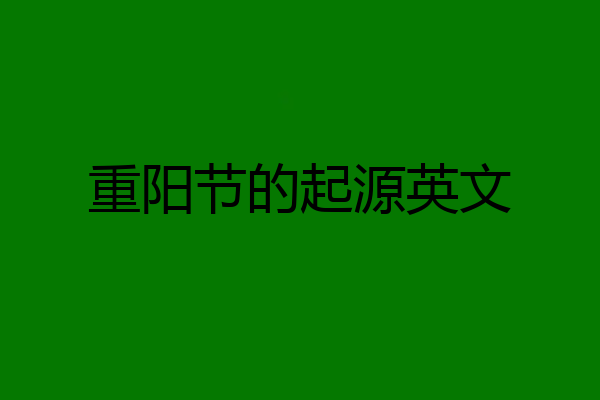
兴业腾达装饰
其一
重阳节
重阳的源头,可追溯到先秦之前。《吕氏春秋》之中《季秋纪》载:“(九月)命家宰,农事备收,举五种之要。藏帝籍之收于神仓,祗敬必饬。”“是日也,大飨帝,尝牺牲,告备于天子。”可见当时已有在秋九月农作物丰收之时祭飨天帝、祭祖,以谢天帝、祖先恩德的活动。
汉代,《西京杂记》中记西汉时的宫人贾佩兰称:“九月九日,佩茱萸,食蓬饵,饮菊花酒,云令人长寿。”相传自此时起,有了重阳节求寿之俗。这是受古代巫师(后为道士)追求长生,采集药物服用的影响。同时还有大型饮宴活动,是由先秦时庆丰收之宴饮发展而来的。《荆楚岁时记》云:“九月九日,四民并籍野饮宴。”隋杜公瞻注云:“九月九日宴会,未知起于何代,然自驻至宋未改。”求长寿及饮宴,构成了重阳节的基础。
其二
重阳节的原型之一是古代的祭祀大火的仪式。
作为古代季节星宿标志的“大火”星,在季秋九月隐退,《夏小正》称“九月内火”,“大火”星的退隐,不仅使一向以大火星为季节生产与季节生活标识的古人失去了时间的坐标,同时使将大火奉若神明的古人产生莫名的恐惧,火神的休眠意味着漫漫长冬的到来,因此,在“内火”时节,一如其出现时要有迎火仪式那样,人们要举行相应的送行祭仪。古代的祭仪情形虽渺茫难晓,但还是可以从后世的重阳节仪中寻找到一些古俗遗痕。如江南部分地区有重阳祭灶的习俗,是家居的火神,由此可见古代九月祭祀“大火”的蛛丝马迹。古人长将重阳与上巳或寒食、九月九与三月三作为对应的春秋大节。汉刘歆《西京杂记》称:“三月上巳,九月重阳,使女游戏,就此祓禊登高。”上巳、寒食与重阳的对应,是以“大火”出没为依据的。
随着人们谋生技术的进步,人们对时间有了新的认识,“火历”让位于一般历法。九月祭火的仪式衰亡,但人们对九月因阳气的衰减而引起的自然物侯变化仍然有着特殊的感受,因此登高避忌的古俗依旧传城,虽然世人已有了新的解释。
重阳在民众生活中成为夏冬交接的时间界标。如果说上巳、寒食是人们渡过漫长冬季后出室畅游的春节,那么重阳大约是在秋寒新至、人民即将隐居时的具有仪式意义的秋游,所以民俗有上巳“踏青”,重阳“辞青”。重阳节俗就围绕着人们的这一时季感受展开。


123456789小姐
The 9th day of the 9th lunar month is the traditional Chongyang Festival, or Double Ninth Festival, is also called "Cornel Festival" and "Chrysanthemum Festival", which has a history of more than 1,700 years. It usually falls in October in the Gregorian calendar.In an ancient and mysterious book Yi Jing (The Book of Changes), number "6" was thought to be of Yin character, meaning feminine or negative, while number "9" was thought to be Yang, meaning masculine or positive. So the number nine in both month and day creates "the Double Ninth Festival", or "Chongyang Festival".

平淡的朝发夕至
重阳节的来历故事英文简介如下:The custom ofascending a height to avoid epidemics was passed down from long time ago.Therefore, the Double Ninth Festival is also called "Height AscendingFestival". The height people will reach is usually a mountain or a tower.Ancient literary figures have left many poems depicting the activity. Eventoday, people still swarm to famous or little known mountains on this day.On this day,people will eat Double Ninth Gao (or Cake). In Chinese, gao (cake) has the samepronunciation with gao (height). People do so just to hope progress ineverything they are engaged in. There is no fixed ways for the Double NinthCake, but super cakes will have as many as nine layers, looking like a tower.

princefrank
The 9th day of the 9th lunar month is the traditional Chongyang Festival, or Double Ninth Festival. It usually falls in October in the Gregorian calendar. In an ancient and mysterious book Yi Jing, or The Book of Changes, number "6" was thought to be of Yin character, meaning feminine or negative, while number "9" was thought to be Yang, meaning masculine or positive. So the number nine in both month and day create the Double Ninth Festival, or Chongyang Festival. Chong in Chinese means "double." Also, as double ninth was pronounced the same as the word to signify "forever", both are "Jiu Jiu," the Chinese ancestors considered it an auspicious day worth celebration. That's why ancient Chinese began to celebrate this festival long time ago. The custom of ascending a height to avoid epidemics was passed down from long time ago. Therefore, the Double Ninth Festival is also called "Height Ascending Festival". The height people will reach is usually a mountain or a tower. Ancient literary figures have left many poems depicting the activity. Even today, people still swarm to famous or little known mountains on this day. On this day, people will eat Double Ninth Gao (or Cake). In Chinese, gao (cake) has the same pronunciation with gao (height). People do so just to hope progress in everything they are engaged in. There is no fixed ways for the Double Ninth Cake, but super cakes will have as many as nine layers, looking like a tower.
优质英语培训问答知识库